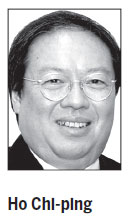Some pitfalls awaiting cocky new CEOs
Updated: 2013-01-19 07:59
By Ho Chi-Ping(HK Edition)
|
|||||||

Whenever a new CEO takes the reins of a company, it seems to be accepted that he/she has a "free ride" for the first 100 days (much the same as Americans give an incoming president). After that "settling-in" period, both shareholders and the workforce take a far more critical stance.
But let's switch back to those first 100 days and consider not what the new boss should be doing to cement his position, but the pitfalls he should avoid - pitfalls into which many cocky new CEOs have plunged, bringing down not only themselves but - depending on how long they were permitted to meddle with things - sometimes the whole corporation.
Mistake No 1: A new CEO should stamp his authority by quickly imposing a series of bold decisions. Wrong! Assuming he was recruited from outside, the new CEO should be boning up on the strengths and weaknesses of the new outfit. Snap decisions based mainly on guesswork and assumptions will begin to destroy the very fabric of the organization. A CEO's decisions affect a group's working, right down to the lowest levels. Procedures that have worked for years are wrenched away and replaced by unfamiliar new methods and systems. Instead of "turning the whole outfit around", the new CEO has turned a lot of employees against himself. Soon department heads with invaluable knowledge of operations will be working the phones to inquire about vacancies among the opposition.
Mistake No 2: The new CEO who believes he's the outfit's smartest person. When chairing a top-level meeting of executives, the wise CEO listens to all views on the issues and draws on the opinions of those around him when summing up on the future course of the related product/idea. He should always show respect for others' views because, in their respective fields, department heads will always possess greater expertise than the CEO.
Mistake No 3: Trying to bring "new blood" into management by appointing a few outside "experts". Ahem, the real purpose of these "experts" is unquestioningly to approve and applaud all of the CEO's decisions. Such yes-men know even less than the CEO about what makes the organization tick and serves no purpose except as his backslappers. A new CEO whose ego requires such massaging isn't worth his salt.
Mistake No 4: Deciding to create a "superteam" of the most dynamic and talented directors and department heads. In theory the new team should brainstorm all current problems for their outfit and swiftly come up with one exciting solution after another. Actually this "superteam" is an amalgamation of the most poisonous bunch of egos in the whole company. They will argue and bicker among themselves, never giving an inch to a rival. No solutions but many more problems!
Mistake No 5: The new CEO should crack the whip and set tough new guidelines on standards.
Instead of triggering a re-doubling of effort across the workplace, these new standards place emphasis on short-time results and obscure the bigger picture, which is to grow product value over the long term. Charts, graphs and diagrams suddenly take control of output and business generally, and everybody but the boss becomes demoralized.
The list of 10 best-performing international CEOs of recent years, as carried in the Harvard Business Review, included: Steve Jobs, Apple; Jeff Bezos, Amazon; Yun Jong-Yong , Samsung; Roger Agnelli, Vale; John C. Martin, Gilead Sciences; Chung Mong-Koo, Hyundai; Y.C. Deveshwar, ITC; David Simon, Simon Property Group; Meg Whitman, eBay; and John T. Chambers, Cisco. It was compiled by Morton Hansen, Herminia Ibarra and Urs Peyer, all of INSEAD, who used as a yardstick shareholder return over the relevant CEO's tenure.
Before looking at the prodigious results they achieved, be aware that they did so despite the ongoing increase in corporate complexity plus the clammy hand of regulators regularly imposing tighter regulations and controls. No doubt their qualities included superb judgment, wisdom, perception, common sense, patience, the ability to lead, and - let's be truthful - a degree of good luck!
The author is deputy chairman and secretary general of China Energy Fund Committee, a think tank on energy and China-related issues.
(HK Edition 01/19/2013 page3)